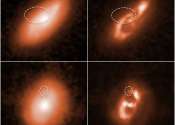Nanoparticle breakthrough could capture unseen light for solar energy conversion
An international team of scientists has demonstrated a breakthrough in the design and function of nanoparticles that could make solar panels more efficient by converting light usually missed by solar cells into usable energy.









